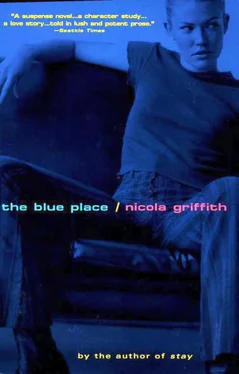“Goodness,” the secretary said.
Beatriz stared at her. Her eyes were like black holes burnt in stiff paper and the hand wrapped around the back of one chair was white at the knuckles. The mask had finally slipped.
The secretary took a step towards the chair. “Let me he’p you with that.”
Beatriz trembled like a deer. I stepped smoothly between them. “Perhaps you could direct us to the bathroom so we can see what we can do about Ms. del Gato’s clothes.” I gestured at the dark splash down Beatriz’s skirt.
“Oh, goodness. Of course. Two doors down on the right.”
I took Beatriz unobtrusively by the elbow. “Let go of the chair,” I said into her ear. “It’s all right. Everything will be all right. Let go of the chair.”
“Yes, fine,” she said, inanely, brightly. I led her through the reception area, through the door, down the corridor, to the bathroom.
“Here we go.” I parked her between the sinks and paper towel dispenser. It would have been a waste of time trying to get her to sit. Her body felt like wood. “I don’t think you need to take the skirt off. Let’s try blotting it first, and soap if that doesn’t work.”
Her trembling turned into shaking. “I understand,” I said, as I dabbed and blotted. “You’re in a strange country. You have jet lag and probably didn’t get any sleep at all in your hotel. Everyone is talking in a foreign language. Even the light switches seem upside down. They expect you to know what to do and you don’t. But that’s why I’m here. I can show you how things work and tell you where to go, and when.” I talked on and on, wondering how long she had been this afraid, so afraid that she had closed herself up like a fan: nothing in, nothing out; running around inside her head frantically plugging chinks in her armour, closing openings through which she might have to reach out and the world might reach in.
“There. That should do it for now.” The shaking had become long, rolling shudders and I thought she might shake herself to pieces. I took one of her cold hands. “Let it out, Beatriz, you’re safe here.”
An indrawn, juddering breath.
“No one will see you. No one will know. Just let it go.”
And she did, in a torrent that was equal parts rage, fear, and despair. She wept bent over, gasping and whooping, then stood straight and howled, face to the ceiling. When the gate was wide open, she leaned both fists against the mirrors and coughed up great chunks of grief and disappointment and broken dreams. She wept on and on until her face was swollen, and shiny with mucus and tears. After a while she settled down to an exhausted drone. I handed her yet another paper towel, stuffed six or seven in my pocket, and picked her up like a child.
I tucked her face into my shoulder so she wouldn’t see the stares, and carried her to the elevator, down fourteen floors, through the lobby, into the street, and across to the parking lot. I lifted her into the front seat, got a blanket from the trunk, tucked her up and fastened her seat belt.
“Warm,” she said.
“Yes, I know, but you need to be warm and I’m going to put the air-conditioning on high.” She needed the comfort more than the warmth, but I didn’t tell her that. “Sleep if you like. I’ll drive you back to your hotel.”
“No.” It was a drowsy whisper. “I hate my hotel. Hate it.”
She wasn’t in a fit state to be seen in public and wouldn’t go back to her hotel. While I waited to pull into traffic I called Happy Herman’s and ordered enough food for a picnic.
The remains of the meal lay on the blanket in the middle of my back lawn and the woman who sat like the Copenhagen mermaid in the too-big shorts and cut-off tee, peering at the base of the pecan tree trying to catch a glimpse of the turtle I’d seen, looked nothing like the Beatriz of that morning. Her eyes were alive, if shy, and the two smiles she had essayed had been quick, but not crippled. I had carried her and the blanket out to the back, fed her, and talked to her about nothing in particular, simply pointing out different birds, squirrels, naming the trees, explaining what all the different condiments on the sandwiches were made of. She’d eaten mechanically at first, then with real attention, and then fallen asleep as I was telling her quietly in my rusty Spanish about the bluebells I used to look for in the Yorkshire woods. She slept for nearly an hour, and when she woke up I showed her the bathroom and found her my smallest tank top and shorts, and now she was all clean and freshly scrubbed and watching the leaves under the pecan tree.
“You’ll have to go back to the hotel barefoot.”
“Yes.”
“I’m sure they’ve seen worse. There, there’s the turtle.” I pointed at the blunt leathery head poking cautiously from under a pile of nature’s debris.
“I see it.”
I told her about shrews, about the constant war going on between the various squirrels, the chipmunks who could leap three feet straight into the air when cornered by the cat that lived next door. Sometimes I had to mime the animal with bushy tail or pointy ears because I didn’t know the Spanish for all that flew and scurried in the Southeast. I’m still not sure she got “chipmunk.” It’s hard mimicking a tiny rodent with big cheek pouches when you’re six feet tall.
“And you have no pets?”
“No. I can watch things in my garden and I don’t have to feed them or take them for checkups, or worry about looking after them when I go away.”
“And they don’t worry about you.”
A bird burst into song among the jasmine. A plane droned in the distance. After a while I said, “Do you want that job at Perrin & Norrander?”
She blinked, then turned away and mumbled something.
“What was that?”
“Yes.”
“Do you really mean it?”
“Yes!”
“Then we need to get you another appointment.”
“They won’t—”
“I’ll talk to them. Blame the secretary. After all, she spilled coffee all over you. How could you be expected to continue with a scalded leg?”
“But I don’t—”
“You do now.” I was implacable. “Your flight to Madrid leaves on Monday afternoon. If we get you a ten o’clock appointment, I can have you at the airport just after midday.”
“They won’t give me the job.”
“No, they might not. But at least you will have tried.”
“What about my clothes?”
“We’ll go shopping.”
I discovered that under her plain exterior beat a flamboyant heart. She wanted to buy dresses and blouses with puffed sleeves and high waists that would be more suitable for a teenager. Fortunately she also wanted them in blood red and flaming orange instead of the available pastels. I steered her towards more practical clothes, made the occasional suggestion. We ended up with flax-coloured linen suit, shorts and T-shirts and sandals, and one stunning sleeveless dress in brain-bursting colours. Whatever made her happy. Then it was her turn to make suggestions. Under her direction, we bought dozens of flats of just-budding impatiens, petunia, and marigold, as well as two long troughs, and sacks of potting compost. “You’ll need seeds and cuttings for later-blooming flowers. These won’t last much beyond June.” She gave them a professional look. “We’ll transplant them tomorrow.”
It was a quite different woman I took back to the Nikko at seven o’clock that evening: smiling, competent, almost pretty.
At midnight I was cruising Cheshire Bridge Road, checking the parking lots of the nude bars. I spotted the primer-coloured 1972 Corvette in the lot of a low-slung building with bricked-up windows, but drove another quarter of a mile until I reached the well-lit Cheshire Strip. I parked in front of the Science Fiction and Mystery Book Shop where odd but harmless customers were happily choosing fat paperbacks, and walked back.
Читать дальше












